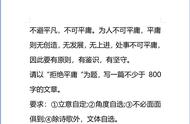
OCTOBER. 十月
FIRST DAY OF SCHOOL.
开学日
Monday, 17th.
星期一,17日
Today is the first day of school. These three months of vacation in the country have passed like a dream. This morning my mother conducted me to the Baretti schoolhouse to have me enter for the third elementary course: I was thinking of the country and went unwillingly. All the streets were swarming with boys: the two book-shops were thronged with fathers and mothers who were purchasing bags, portfolios, and copy-books, and in front of the school so many people had collected, that the beadle and the policeman found it difficult to keep the entrance disencumbered. Near the door, I felt myself touched on the shoulder: it was my master of the second class, cheerful, as usual, and with his red hair ruffled, and he said to me:—
今天是开学第一天。在乡间的三个月假期像梦一样地过去了。今天早晨母亲带我到巴莱缇校舍去,让我报名参加小学四年级的课程:我不情不愿地去了,心里还想着乡间。所有的街道都挤满了学生;两家书店里塞满了正在购买书包、文件夹和字帖的家长们。学校前面已经聚集了很多人,弄得仪仗官和警察很难保持大门的畅通。到了校门口,我感觉有人碰了一下我的肩膀——是我三年级的班主任,他和往常一样欢快,红色的头发乱卷着,对我说道:
"So we are separated forever, Enrico?"
“那么我们就永远分开了,安利柯?”
I knew it perfectly well, yet these words pained me. We made our way in with difficulty. Ladies, gentlemen, women of the people, workmen, officials, nuns, servants, all leading boys with one hand, and holding the promotion books in the other, filled the anteroom and the stairs, making such a buzzing, that it seemed as though one were entering a theatre. I beheld again with pleasure that large room on the ground floor, with the doors leading to the seven classes, where I had passed nearly every day for three years. There was a throng; the teachers were goi...
我知道得很清楚,但这些话还是让我痛心。我们好容易才进到里面。夫人们、绅士们、普通妇人们、工人们、官员们、修女们、仆人们,都一手牵着小男孩,一手抱着成绩册,占满了接待室和楼梯。他们发出的声响如此嘈杂,就像走进了戏院一样。我又满心欢喜地看了一下一楼那个巨大的房间,它的房门通往七个班级,三年来我几乎每日都要穿过这个房间。那里有一大群人,老师们来来往往的。我二年级时的女老师在教室门口跟我打招呼,她说:
"Enrico, you are going to the floor above this year. I shall never see you pass by any more!" and she gazed sadly at me. The director was surrounded by women in distress because there was no room for their sons, and it struck me that his beard was a little whiter than it had been last year. I found the boys had grown taller and stouter. On the ground floor, where the divisions had already been made, there were little children of the first and lowest section, who did not want to enter the class-rooms, and who resisted like donkeys: it was necessary to drag them in by force, and some escaped from the benches; others, when they saw their parents depart, began to cry, and the parents had to go back and comfort and reprimand them, and the teachers were in despair.
“安利柯,你今年要到楼上去了。我再也看不到你从这儿走过了!”然后她伤心地看着我。校长被一群穷困的妇人围绕着,因为没地方供她们的儿子入学了。我突然发现他的胡子比去年更白了一点儿。我发现学生们长得更高更壮了。在一楼,分班已经完成了,一年级的小孩子们不愿意进到教室里去,像驴子一样抵抗着,必须把他们拽进去才行。一些孩子从长凳上逃了出去,另一些看到父母离开就开始哭,父母不得不返回来安慰和训斥他们,老师们都束手无策。
My little brother was placed in the class of Mistress Delcati: I was put with Master Perboni, up stairs on the first floor. At ten o'clock we were all in our classes: fifty-four of us; only fifteen or sixteen of my companions of the second class, among them, Derossi, the one who always gets the first prize. The school seemed to me so small and gloomy when I thought of the woods and the mountains where I had passed the summer! I thought again, too, of my master in the second class, who was so good, and who always smiled at us, and was so small that he seemed to be one of us, and I grieved that I should no longer see him there, with his tumbled red hair. Our teacher is tall; he has no beard; his hair is gray and long; and he has a perpendicular wrinkle on his forehead: he has a big voice, and he looks at us fixedly, one after the other, as though he were reading our inmost thoughts; and he never smiles. I said to myself: "This is my first day. There are nine months more. What toil, what monthly examinations, what fatigue!" I really needed to see my mother when I came out, and I ran to kiss her hand. She said to me:—
我的弟弟被编入女老师代尔卡谛所教的班里,我则被分到配巴尼老师的班里,在上面的二楼。十点我们都进了教室。我们班共五十四人,只有十五或十六人是我三年级时的同窗,包括那个总拿一等奖的代洛西。一想起我消夏的那片树林和那些山峦,我就觉得学校又小又阴暗了。我又想起我三年级的班主任来,他人可好了,常常对我们笑,个子那么小,就好像是我们中的一员一样。想到我再也不能看见顶着一头蓬乱红发的他,我伤心了。我们的老师是高个子,他没有胡子,留着长长的灰白头发,前额上有道竖直的皱纹;他嗓门很大,专注地逐个看着我们,就好像在读着我们心灵最深处的想法一样;而且他从来不笑。我对自己说:“这是我的第一天。还有九个月呢。什么用功,什么月考,什么疲劳呀!”一放学,我就迫不及待地去找母亲,冲过去吻她的手。她对我说:
"Courage, Enrico! we will study together." And I returned home content. But I no longer have my master, with his kind, merry smile, and school does not seem pleasant to me as it did before.
“加油,安利柯,我们一起学习。”然后我就心满意足地回家了。但是我再也见不着我的班主任和他和蔼、舒心的笑容了,学校对我来说不像从前那么令人愉快了。
OUR MASTER.
我们的班主任
Tuesday, 18th.
星期二,18日
My new teacher pleases me also, since this morning. While we were coming in, and when he was already seated at his post, some one of his scholars of last year every now and then peeped in at the door to salute him; they would present themselves and greet him:—
从今天早晨起,我的新老师也让我喜欢起来了。我们进教室的时候,他已经坐在他的座位上了,一些他去年教过的学生不时地从门口探进头来和他打招呼,他们也会走进来向他问好:
"Good morning, Signor Teacher!" "Good morning, Signor Perboni!" Some entered, touched his hand, and ran away. It was evident that they liked him, and would have liked to return to him. He responded, "Good morning," and shook the hands which were extended to him, but he looked at no one; at every greeting his smile remained serious, with that perpendicular wrinkle on his brow, with his face turned towards the window, and staring at the roof of the house opposite; and instead of being cheered by these greetings, he seemed to suffer from them. Then he surveyed us attentively, one after the other. While he was dictating, he descended and walked among the benches, and, catching sight of a boy whose face was all red with little pimples, he stopped dictating, took the lad's face between his hands and examined it; then he asked him what was the matter with him, and laid his hand on his forehead, to feel if it was hot. Meanwhile, a boy behind him got up on the bench, and began to play the marionette. The teacher turned round suddenly; the boy resumed his seat at one dash, and remained there, with head hanging, in expectation of being punished. The master placed one hand on his head and said to him:—
“早安,老师!”“早安,配巴尼先生!”一些学生走了进来,握了他的手,就跑开了。这说明他们喜欢他,仍想做他的学生。他回答“早安”,并且握了握那些伸过来的手,但是他谁也不看。每次问候时,他的笑容都保持严肃,眉头间那条纵纹一皱,脸转向窗外,盯着对面楼的屋顶。他看上去并不为这些问好感到高兴,反倒像是在受苦。然后他专心地挨个审视起我们。他听写的时候,走下讲台,在座位之间走动,看到一个脸上长着小丘疹的、满脸通红的男孩,就停下了听写,两手托了男孩的头来检查,然后他问他哪里不舒服,并把手放在他前额上试试发不发热。这时,老师身后的一个学生站上长凳,开始玩起牵线木偶来。老师突然转过身,那个男孩立刻坐回座位,垂着脑袋呆在那里,等待受罚。老师把一只手放在他头上,对他说:
"Don't do so again." Nothing more.
“不要再做这种事了。”就再没说什么。
Then he returned to his table and finished the dictation. When he had finished dictating, he looked at us a moment in silence; then he said, very, very slowly, with his big but kind voice:—
然后他返回讲台,完成了听写。听写完后,他静静地看了我们一会儿,然后用他那响亮却亲切的声音非常非常缓慢地说:
"Listen. We have a year to pass together; let us see that we pass it well. Study and be good. I have no family; you are my family. Last year I had still a mother: she is dead. I am left alone. I have no one but you in all the world; I have no other affection, no other thought than you: you must be my sons. I wish you well, and you must like me too. I do not wish to be obliged to punish any one. Show me that you are boys of heart: our school shall be a family, and you shall be my consolation and my pride. I do not ask you to give me a promise on your word of honor; I am sure that in your hearts you have already answered me 'yes,' and I thank you."
“听好。我们将共同度过一年的时间,让我们好好地过这一年吧。好好学习,乖乖听话。我没有家人,你们就是我的家人。去年我母亲还活着,现在她去世了。我被孤零零地撇下了。除了你们,我别无亲人了;除了你们,我别无所爱,别无所思。你们就是我的儿子。我祝福你们,你们也一定要喜欢我。我不愿被迫去责罚任何人。让我看看你们都是有心的孩子,我们的学校会成为一个大家庭,你们会成为我的慰藉和骄傲。我不是要你们跟我担保承诺,我确定你们已经在心里用‘是’回答了我,我谢谢你们。”
At that moment the beadle entered to announce the close of school. We all left our seats very, very quietly. The boy who had stood up on the bench approached the master, and said to him, in a trembling voice:—
正在那时,仪仗官走进来宣布放学。我们都非常非常安静地离开了座位。那个站上长凳的男孩走到老师跟前,用颤抖的声音对他说:
"Forgive me, Signor Master."
“原谅我吧,老师。”
The master kissed him on the brow, and said, "Go, my son."
老师吻了一下他的眉毛,说:“回家吧,我的孩子。”
AN ACCIDENT.
一场事故
Friday, 21st.
星期五,21日
The year has begun with an accident. On my way to school this morning I was repeating to my father these words of our teacher, when we perceived that the street was full of people, who were pressing close to the door of the schoolhouse. Suddenly my father said: "An accident! The year is beginning badly!"
这学年以一场事故开始。今天早晨去学校的路上,我正向父亲复述着老师的话,这时我们发觉街上站满了人,人群正在向校舍门口逼近。我父亲突然说:“出事了!这学年开始得不妙啊!”
We entered with great difficulty. The big hall was crowded with parents and children, whom the teachers had not succeeded in drawing off into the class-rooms, and all were turning towards the director's room, and we heard the words, "Poor boy! Poor Robetti!"
我们好不容易才进到里面。大厅挤满了家长和没能被老师成功拉回教室去的孩子们,所有的人都向校长的房间涌去。我们听到有人说着“可怜的孩子!可怜的洛佩谛!”
Over their heads, at the end of the room, we could see the helmet of a policeman, and the bald head of the director; then a gentleman with a tall hat entered, and all said, "That is the doctor." My father inquired of a master, "What has happened?"— "A wheel has passed over his foot," replied the latter. "His foot has been crushed," said another. He was a boy belonging to the second class, who, on his way to school through the Via Dora Grossa, seeing a little child of the lowest class, who had run away from its mother, fall down in the middle of the street, a few paces from an omnibus which was bearing down upon it, had hastened boldly forward, caught up the child, and placed it in safety; but, as he had not withdrawn his own foot quickly enough, the wheel of the omnibus had passed over it. He is the son of a captain of artillery. While we were being told this, a woman entered the big hall, like a lunatic, and forced her way through the crowd: she was Robetti's mother, who had been sent for. Another woman hastened towards her, and flung her arms about her neck, with sobs: it was the mother of the baby who had been saved. Both flew into the room, and a desperate cry made itself heard: "Oh my Giulio! My child!"
从他们头顶上看过去,在房间的尽头,我们可以看到一个警察的头盔和校长光秃秃的脑袋。接着,一位戴着高帽的绅士走了进来,所有人都说:“医生来了。”我父亲问一位老师:“发生什么事了?”“一个车轮轧过了他的脚。”后者回答。“他脚骨碎了。”另一个人说。他是三年级的一个学生,在上学的路上经过维亚多拉格罗萨时,看到一个一年级的小男孩从他母亲身旁跑开,倒在马路中央;几步之远的地方一辆公共马车正向他倒下的方向疾驶而来;他大胆地跑向前去抱起那个男孩,把他放到安全的地方;但是由于他抽脚不够快,被公共马车的车轮轧伤了。救人的是一位炮兵上尉的儿子。正当我们听着这些事情的时候,一个女人疯了似的闯进大厅,从人群中拱着往前挤:她是洛佩谛的母亲,是被人叫过来的。另一个女人急忙奔向她,啜泣着伸出双手抱住她的头:这是被救男孩的母亲。两个人都奔入那个房间,随后发出一声绝望的呐喊:“哦,我的孩子!我的孩子啊!”
At that moment a carriage stopped before the door, and a little later the director made his appearance, with the boy in his arms; the latter leaned his head on his shoulder, with pallid face and closed eyes. Every one stood very still; the sobs of the mother were audible. The director paused a moment, quite pale, and raised the boy up a little in his arms, in order to show him to the people. And then the masters, mistresses, parents, and boys all murmured together: "Bravo, Robetti! Bravo, poor child!" and they threw kisses to him; the mistresses and boys who were near him kissed his hands and his arms. He opened his eyes and said, "My portfolio!" The mother of the little boy whom he had saved showed it to him and said, amid her tears, "I will carry it for you, my dear little angel; I will carry it for you." And in the meantime, the mother of the wounded boy smiled, as she covered her face with her hands. They went out, placed the lad comfortably in the carriage, and the carriage drove away. Then we all entered school in silence.
这时,一辆马车停在了校门口,又过了一会儿,校长抱着那个男孩出现了;男孩把头靠着校长的肩膀上,面无血色,闭着眼睛。大家都静静地站着,只听见那位母亲的啜泣声。校长停留了一阵子,面色十分苍白;为了让大家看到,他把怀里的小男孩稍微举高了一些。随后老师、家长、学生都一齐小声地说道:“做得好啊,洛佩谛!做得好啊,可怜的孩子!”他们向他献吻;靠近一点儿的女老师和学生都去吻他的手和手臂。他睁开眼睛说道:“我的书包!”他救的那个男孩的母亲把书包给他看,流着眼泪说:“我会替你拿着的,我的小天使,我会替你拿着的。”这时受伤的男孩的母亲笑了,她用手捂住了脸。他们走了出去,把那个男孩小心地放到马车里,接着马车就开走了。之后我们都默默地走进了学校。
THE CALABRIAN BOY.
卡拉布里亚的男孩
Saturday, 22nd.
星期六,22日
Yesterday afternoon, while the master was telling us the news of poor Robetti, who will have to go on crutches, the director entered with a new pupil, a lad with a very brown face, black hair, large black eyes, and thick eyebrows which met on his forehead: he was dressed entirely in dark clothes, with a black morocco belt round his waist. The director went away, after speaking a few words in the master's ear, leaving beside the latter the boy, who glanced about with his big black eyes as though frightened. The master took him by the hand, and said to the class: "You ought to be glad. Today there enters our school a little Italian born in Reggio, in Calabria, more than five hundred miles from here. Love your brother who has come from so far away. He was born in a glorious land, which has given illustrious men to Italy, and which now furnishes her with stout laborers and brave soldiers; in one of the most beautiful lands of our country, where there are great forests, and great mountains, inhabited by people full of talent and courage. Treat him well, so that he shall not perceive that he is far away from the city in which he was born; make him see that an Italian boy, in whatever Italian school he sets his foot, will find brothers there." So saying, he rose and pointed out on the wall map of Italy the spot where lay Reggio, in Calabria. Then he called loudly:—
昨天下午,当老师正在告诉我们可怜的洛佩谛将不得不依靠拐杖走路的消息时,校长领着一个新学生走了进来。他肤色很深,头发乌黑,有一双大大的眼睛,浓浓的眉毛在前额交会在一起。他全身穿着黑衣服,腰间系着一条摩洛哥革腰带。校长对老师耳语了几句后就离开了,把那个男孩留在了老师身旁。男孩好像被吓坏了似的,用他大大的黑眼睛向四周环视着。老师拉着他的手,向全班说道:“你们应该高兴。今天,一名从五百多英里外的卡拉布里亚的雷焦来的意大利孩子加入了我们学校。大家要友好对待这位远道而来的同胞。他出生在一片荣耀的土地,那里走出过一批名人志士,也正在为国家输送着强健的劳动者和勇敢的军人;那里是我们国家最美丽的地方之一,有广袤的森林、巍峨的山峦,住着富有才能和勇气的人们。好好待他吧,这样他就不会觉得背井离乡了;要让他看到,一个意大利男孩不管在哪所意大利学校落脚,都会在那里找到自己的同胞。”这样说着,他站起来,在墙上的意大利地图上指出卡拉布里亚的雷焦的位置。接着他大声喊道:
"Ernesto Derossi!"—the boy who always has the first prize. Derossi rose.
“尔耐斯托·代洛西!”——他是每次都拿一等奖的学生。代洛西站了起来。
"Come here," said the master. Derossi left his bench and stepped up to the little table, facing the Calabrian.
“到这里来。”老师说。代洛西离开了座位,走上了小讲台,面对着那个卡拉布里亚男孩。
"As the head boy in the school," said the master to him, "bestow the embrace of welcome on this new companion, in the name of the whole class—the embrace of the sons of Piedmont to the son of Calabria."
“你是班长,”老师对他说,“请以全班的名义,用拥抱来欢迎这个新来的伙伴——代表皮德蒙特的孩子去拥抱卡拉布里亚的孩子。”
Derossi embraced the Calabrian, saying in his clear voice, "Welcome!" and the other kissed him impetuously on the cheeks. All clapped their hands. "Silence!" cried the master; "don't clap your hands in school!" But it was evident that he was pleased. And the Calabrian was pleased also. The master assigned him a place, and accompanied him to the bench. Then he said again:—
代洛西拥抱了那个卡拉布里亚男孩,用他清晰的声音说道:“欢迎你!”卡拉布里亚男孩也热烈地吻了代洛西的脸颊。所有人都鼓起了掌。“安静!”老师大声说,“在学校里不准拍手!”但是很明显,他很高兴。卡拉布里亚男孩也很高兴。老师给他安排了一个座位,并陪他走到长凳边。随后他又说道:
"Bear well in mind what I have said to you. In order that this case might occur, that a Calabrian boy should be as though in his own house at Turin, and that a boy from Turin should be at home in Calabria, our country fought for fifty years, and thirty thousand Italians died. You must all respect and love each other; but any one of you who should give offence to this comrade, because he was not born in our province, would render himself unworthy of ever again raising his eyes from the earth when he passes the tricolored flag."
“请好好记住我刚才对你们说的话。卡拉布里亚的孩子在都灵要像住在自己家里一样,都灵的孩子在卡拉布里亚也要像在家一样,为了使这种情况能够实现,我们的国家为此打了五十年的仗,三万意大利人为此战死。你们所有人一定要互敬互爱,但凡有谁因为他不是本地人而对这个新同学无礼,经过三色旗时就只好垂下头,再也没资格面对它。”
Hardly was the Calabrian seated in his place, when his neighbors presented him with pens and a print; and another boy, from the last bench, sent him a Swiss postage-stamp.
卡拉布里亚男孩几乎还没落座,邻座的孩子们就送给了他钢笔和一个印章,最后一排的一个男孩给了他一枚瑞士的邮票。
MY COMRADES.
我的同学们
Tuesday, 25th.
星期二,25日
The boy who sent the postage-stamp to the Calabrian is the one who pleases me best of all. His name is Garrone: he is the biggest boy in the class: he is about fourteen years old; his head is large, his shoulders broad; he is good, as one can see when he smiles; but it seems as though he always thought like a man. I already know many of my comrades. Another one pleases me, too, by the name of Coretti, and he wears chocolate-colored trousers and a catskin cap: he is always jolly; he is the son of a huckster of wood, who was a soldier in the war of 1866, in the squadron of Prince Umberto, and they say that he has three medals. There is little Nelli, a poor hunchback, a weak boy, with a thin face. There is one who is very well dressed, who always wears fine Florentine plush, and is named Votini. On the bench in front of me there is a boy who is called "the little mason" because his father is a mason: his face is as round as an apple, with a nose like a small ball; he possesses a special talent: he knows how to make a hare's face, and they all get him to make a hare's face, and then they laugh. He wears a little ragged cap, which he carries rolled up in his pocket like a handkerchief. Beside the little mason there sits Garoffi, a long, thin, silly fellow, with a nose and beak of a screech owl, and very small eyes, who is always trafficking in little pens and images and match-boxes, and who writes the lesson on his nails, in order that he may read it on the sly. Then there is a young gentleman, Carlo Nobis, who seems very haughty; and he is between two boys who are sympathetic to me,—the son of a blacksmith-ironmonger, clad in a jacket which reaches to his knees, who is pale, as though from illness, who always has a fightened air, and who never laughs; and one with red hair, who has a useless arm, and wears it suspended from his neck; his father has gone away to America, and his mother goes about peddling pot-herbs.
那个送邮票给卡拉布里亚男孩的是我最喜欢的一个同学。他的名字叫卡隆,是班里个头最大的学生,大约十四岁,头大肩宽;他人不错,从他笑的时候可以看出来,但是看上去他似乎总是像大人一样在思考着。我已经认识许多同学了。另一个名字叫可莱谛的,我也喜欢;他穿巧克力色的裤子,戴猫皮帽;他总是很快乐;他是一个木材商人的儿子;他父亲在一八六六年的战役中跟着温培尔脱亲王打过仗,据说他还拿到过三枚勋章呢。有个小内利,他脸蛋瘦削,是个可怜的驼背体弱的男孩。有个叫华梯尼的,打扮得非常好看,总是穿着精美的佛罗伦萨长毛绒。坐在我前面的长凳上的是一个叫做“小石匠”的男孩,因为他的父亲是一名石匠。他的脸圆得像苹果,鼻子像一个小球;他有一项特殊的才能,就是懂得如何扮野兔的鬼脸;他们全都叫他扮野兔的鬼脸,然后大笑。他戴一顶有点儿破烂的帽子,不戴的时候,就把帽子像手帕一样卷起来装在口袋里。小石匠的旁边坐着卡洛斐,是个又瘦又高、傻傻的家伙;他长着鸣角鸮的钩型嘴、小小的眼睛;他常常拿钢笔、小画片和火柴盒来做买卖;他把课文写在手指甲上当小抄。还有一个叫卡洛·诺琵斯的年轻绅士,他看起来十分目中无人;他坐在两个对我友好的男孩中间——一个是铁匠家的儿子,穿着长及膝盖的夹克,脸色苍白,好像是由于生病的关系,他总是怯生生的样子,从来不笑;另一个是红头发的男孩,他一只手臂残疾,总是挂在脖子上,他的父亲去了美国,母亲沿街叫卖野菜。
And there is another curious type,—my neighbor on the left,—Stardi—small and thickset, with no neck,—a gruff fellow, who speaks to no one, and seems not to understand much, but stands attending to the master without winking, his brow corrugated with wrinkles, and his teeth clenched; and if he is questioned when the master is speaking, he makes no reply the first and second times, and the third time he gives a kick; and beside him there is a bold, cunning face, belonging to a boy named Franti, who has already been expelled from another district. There are, in addition, two brothers who are dressed exactly alike, who resemble each other to a hair, and both of whom wear caps of Calabrian cut, with a peasant's plume. But handsomer than all the rest, the one who has the most talent, who will surely be the head this year also, is Derossi; and the master, who has already perceived this, always questions him. But I like Precossi, the son of the blacksmith-ironmonger, the one with the long jacket, who seems sickly. They say that his father beats him; he is very timid, and every time that he addresses or touches any one, he says, "Excuse me," and gazes at them with his kind, sad eyes. But Garrone is the biggest and the nicest.
还有另一种奇怪的同学——我左边的邻座斯带地——身材矮胖,没有脖子;他是个冷淡的家伙,不和任何人说话,看上去懂的也不多,但是却紧锁眉头,咬紧牙关,眼睛都不眨一下,全神贯注地听老师的话。如果老师说话的当下,有人问他问题,他头两次都不会回答,若是第三次来问,他就会踢那人一脚了;他旁边是一个长着一张精明的宽脸的男孩,名叫弗兰蒂,曾被别的区的学校开除过。还有一对穿得一模一样的兄弟,两人相像到连发型都一致,都戴着卡拉布里亚风格的帽子,上面饰有农夫的羽毛。但是所有同伴之中,最英俊的、最有才能的、今年也必拿头奖的是代洛西,老师也已然领会到这一点,总是提问他。但是我喜欢铁匠的儿子泼来可西,那个穿着长长的夹克、看起来病恹恹的男孩。他们说他父亲常打他;他非常胆小,每当他跟别人讲话或是碰到别人时,他都会说:“请原谅我。”然后用他友善、伤感的眼神望着他们。但是卡隆是最年长的,也是人最好的。
A GENEROUS DEED.
见义勇为
Wednesday, 26th.
星期三,26日
It was this very morning that Garrone let us know what he is like. When I entered the school a little late, because the mistress of the upper first had stopped me to inquire at what hour she could find me at home, the master had not yet arrived, and three or four boys were tormenting poor Crossi, the one with the red hair, who has a dead arm, and whose mother sells vegetables. They were poking him with rulers, hitting him in the face with chestnut shells, and were making him out to be a cripple and a monster, by mimicking him, with his arm hanging from his neck. And he, alone on the end of the bench, and quite pale, began to be affected by it, gazing now at one and now at another with beseeching eyes, that they might leave him in peace. But the others mocked him worse than ever, and he began to tremble and to turn crimson with rage. All at once, Franti, the boy with the repulsive face, sprang upon a bench, and pretending that he was carrying a basket on each arm, he aped the mother of Crossi, when she used to come to wait for her son at the door; for she is ill now. Many began to laugh loudly. Then Crossi lost his head, and seizing an inkstand, he hurled it at the other's head with all his strength; but Franti dodged, and the inkstand struck the master, who entered at the moment, full in the breast.
正是今天早晨,卡隆让我们了解了他的为人。由于二年级的女老师叫住我问我何时在家,我到校稍晚了些,这时班主任还未到,三四个男孩正在戏弄可怜的克洛西,那个红发的、有只残疾手臂的、母亲卖蔬菜的男孩。他们用直尺戳他,用栗子壳砸他的脸,模仿他手臂挂在脖子上的样子,说他是瘸子和怪物。他一个人坐在长凳的一端,脸色相当苍白,开始发慌,用恳求的眼神一下看看这个,一下又看看那个,希望他们可以别去打扰他。但是其他人变本加厉地嘲笑起他来,他身子开始发抖,脸色因发怒而涨得深红。突然,那个长相让人讨厌的弗兰蒂跳上椅子,装做两手各拎着一个篮子的样子,在模仿克洛西的母亲过去常常来校门口等他的儿子的模样;而现在她生病了。很多人都开始放声大笑。克洛西失去了理智,抓起一只墨水瓶,全力向弗兰蒂的头猛砸过去;但是弗兰蒂闪躲开了,墨水瓶砸中了正进门的老师,墨汁溅满了他的胸部。
All flew to their places, and became silent with terror.
所有人都跑回了座位,害怕得不敢发出声音。
The master, quite pale, went to his table, and said in a constrained voice:—
老师脸色惨白,走到讲台上,用压抑的声音说:
"Who did it?"
“是谁*?”
No one replied.
没人回答。
The master cried out once more, raising his voice still louder, "Who is it?"
老师又加大音量大喊了一声:“是谁*?”
Then Garrone, moved to pity for poor Crossi, rose abruptly and said, resolutely, "It was I."
卡隆同情可怜的克洛西,突然站起来,毅然地说:“是我。”
The master looked at him, looked at the stupefied scholars; then said in a tranquil voice, "It was not you."
老师看了看他,看了看错愕的学生们,然后用平静的声音说:“不是你。”
And, after a moment: "The culprit shall not be punished. Let him rise!"
过了一会儿,他又说,“犯错者不会受到惩罚。站起来吧!”
Crossi rose and said, weeping, "They were striking me and insulting me, and I lost my head, and threw it."
克洛西站起来,哭着说:“他们打我,欺侮我,我失去了理智,把墨水瓶砸了出去。”
"Sit down," said the master. "Let those who provoked him rise."
“坐下吧,”老师说,“挑衅他的人站起来。”
Four rose, and hung their heads.
四个人站了起来,都低垂着头。
"You," said the master, "have insulted a companion who had given you no provocation; you have scoffed at an unfortunate lad, you have struck a weak person who could not defend himself. You have committed one of the basest, the most shameful acts with which a human creature can stain himself. Cowards!"
“你们,”老师说,“欺侮了一个不曾招惹你们的同学,你们嘲弄了一个不幸的孩子,你们攻击了一个无还手之力的弱者。你们犯下的是一项人类最能给自己抹黑的、最可耻、最丢脸的行为。胆小鬼们!”
Having said this, he came down among the benches, put his hand under Garrone's chin, as the latter stood with drooping head, and having made him raise it, he looked him straight in the eye, and said to him, "You are a noble soul."
说完这些,他走下讲台,到座位中间去。他用手托着垂着头站着的卡隆的下巴,让他把头抬起来,直视他的眼睛,对他说:“你有高尚的品德。”
Garrone profited by the occasion to murmur some words, I know not what, in the ear of the master; and he, turning towards the four culprits, said, abruptly, "I forgive you."
卡隆借机向老师耳语了几句,我没听清楚;接着老师转向四个犯错的人,出乎意料地说:“我原谅你们。”
MY SCHOOLMISTRESS OF THE UPPER FIRST.
我二年级的女老师
Thursday, 27th.
星期四,27日
My schoolmistress has kept her promise which she made, and came Today just as I was on the point of going out with my mother to carry some linen to a poor woman recommended by the Gazette. It was a year since I had seen her in our house. We all made a great deal of her. She is just the same as ever, a little thing, with a green veil wound about her bonnet, carelessly dressed, and with untidy hair, because she has not time to keep herself nice; but with a little less color than last year, with some white hairs, and a constant cough. My mother said to her:—
我的女老师信守诺言,今天上门来拜访,正巧碰上我和母亲正要外出,我们要带一些亚麻布给《公报》上报道过的一位贫困的妇女。从老师上次来我家,已经有一年了。我们都盛情招待她。她模样一如往昔,身材瘦小,帽子上缠绕着一条绿色的面纱,衣着随意,头发凌乱,因为她没功夫精心打扮自己。但是她脸色比去年稍显黯淡,多了些白发,时不时地咳嗽一下。我母亲对她说:
"And your health, my dear mistress? You do not take sufficient care of yourself!"
“那么,你的健康怎样,我亲爱的老师?你对自己照顾得不够!”
"It does not matter," the other replied, with her smile, at once cheerful and melancholy.
“没关系的,”老师笑着答道,欢乐中带着一丝忧伤。
"You speak too loud," my mother added; "you exert yourself too much with your boys."
“你讲话太大声了,”母亲补充道,“你对学生们太费心力了。”
That is true; her voice is always to be heard; I remember how it was when I went to school to her; she talked and talked all the time, so that the boys might not divert their attention, and she did not remain seated a moment. I felt quite sure that she would come, because she never forgets her pupils; she remembers their names for years; on the days of the monthly examination, she runs to ask the director what marks they have won; she waits for them at the entrance, and makes them show their compositions, in order that she may see what progress they have made; and many still come from the gymnasium to see her, who already wear long trousers and a watch. Today she had come back in a great state of excitement, from the picture-gallery, whither she had taken her boys, just as she had conducted them all to a museum every Thursday in years gone by, and explained everything to them. The poor mistress has grown still thinner than of old. But she is always brisk, and always becomes animated when she speaks of her school. She wanted to have a peep at the bed on which she had seen me lying very ill two years ago, and which is now occupied by my brother; she gazed at it for a while, and could not speak. She was obliged to go away soon to visit a boy belonging to her class, the son of a saddler, who is ill with the measles; and she had besides a package of sheets to correct, a whole evening's work, and she has still a private lesson in arithmetic to give to the mistress of a shop before nightfall.
那是真的,大家总能听见她的声音。我还记得做她的学生时的情形,她一直地讲啊讲啊,使得学生们没法分散注意力,她一刻也不曾坐下来。我相当肯定她会来拜访,因为她从不会忘记自己的学生,过了好多年都还能记得学生的名字。在月考的那天,她会跑去向校长问学生的成绩。她在校门口等学生,叫他们给她看他们写的作文,这样她就能知道他们进步了多少。很多已经穿上长裤、戴上手表的学生仍然从中学跑回来看她。多年来,每个星期四她都会带学生们去参观一个博物馆,并把一切解释给他们听。今天她刚领着学生们去参观了画廊,兴高采烈地回来了。可怜的老师上了年纪,愈加消瘦了。但她总是那样活泼,谈起学校的时候她总是兴致勃勃的。两年前我重病,她来看过我,她想看一眼我当时躺的床。那床现在已经归我弟弟睡了,她凝视了它好一会儿,没能说出话来。她必须离开了,因为还要去拜访一个自己班上的学生,他是马贩的儿子,患了麻疹;另外她还有一叠作业要批改,要干上一整晚了;在天黑前,她还要给一家店铺的老板娘做家教,补习算术。
"Well, Enrico," she said to me as she was going, "are you still fond of your schoolmistress, now that you solve difficult problems and write long compositions?" She kissed me, and called up once more from the foot of the stairs: "You are not to forget me, you know, Enrico!" Oh, my kind teacher, never, never will I forget thee! Even when I grow up I will remember thee and will go to seek thee among thy boys; and every time that I pass near a school and hear the voice of a schoolmistress, I shall think that I hear thy voice, and I shall recall the two years that I passed in thy school, where I learned so many things, where I so often saw thee ill and weary, but always earnest, always indulgent, in despair when any one acquired a bad trick in the writing-fingers, trembling when the examiners interrogated us, happy when we made a good appearance, always kind and loving as a mother. Never, never shall I forget thee, my teacher!
“好吧,安利柯,”她临走时对我说,“既然你都能解决难的问题,也能写长篇的作文了,你还会喜爱你以前的老师吗?”她亲吻了我,在楼梯底下又向上叫我:“你可不要忘了我,你知道的,安利柯!”哦,我亲切的老师,我永远、永远不会忘记你的!即使我长大了,我还是会记得你,会在你的学生里找寻你;每当我路过一所学校,或是听到一位女老师的声音,我会把它当成听到了你的声音,我会回忆起在你那里学习的两年时光。那段时间我学到了很多的东西,我常常见你气色不好、满脸倦容,但对我们总是热心而宽容;一有学生养成不好的写字习惯时,你会忧心忡忡;当考试员考问我们的时候,你会担心得发抖;当我们表现出色时,你会满心欢喜;你总是像母亲一样和蔼、充满爱心。我永远、永远不会忘记你的,我的老师!
IN AN ATTIC.
在阁楼里
Friday, 28th.
星期五,28日
Yesterday afternoon I went with my mother and my sister Sylvia, to carry the linen to the poor woman recommended by the newspaper: I carried the bundle; Sylvia had the paper with the initials of the name and the address. We climbed to the very roof of a tall house, to a long corridor with many doors. My mother knocked at the last; it was opened by a woman who was still young, blond and thin, and it instantly struck me that I had seen her many times before, with that very same blue kerchief that she wore on her head.
昨天下午,我同母亲、姐姐西尔维娅一起去送亚麻布品给报纸报道的那个贫困的妇女。我提着包裹,西尔维娅拿着写着这位妇女名字首字母和住址的纸条。我们爬上了一座高楼的顶部,有条走廊通向许多房间。母亲敲了最后一间的门。一个年轻的、瘦瘦的金发妇女打开了门,我立刻想起我以前见过她很多次,她头上总戴着这一条蓝色大方巾。
"Are you the person of whom the newspaper says so and so?" asked my mother.
“你是报纸上所说的那位吗?”我母亲问道。
"Yes, signora, I am."
“是的,夫人,我是。”
"Well, we have brought you a little linen." Then the woman began to thank us and bless us, and could not make enough of it. Meanwhile I espied in one corner of the bare, dark room, a boy kneeling in front of a chair, with his back turned towards us, who appeared to be writing; and he really was writing, with his paper on the chair and his inkstand on the floor. How did he manage to write thus in the dark? While I was saying this to myself, I suddenly recognized the red hair and the coarse jacket of Crossi, the son of the vegetable-pedler, the boy with the useless arm. I told my mother softly, while the woman was putting away the things.
“我们给你带了一些亚麻布品。”那位妇女开始感谢我们,并祝福我们,好像怎么感谢怎么祝福都不够似的。这时,我发现在这又空又暗的房间一角,一个男孩跪在一张椅子前面,背对着我们,好像在写字。他的确是在写字,把纸铺在椅子上,墨水瓶放在地板上。他是怎么做到在黑暗中写字的呢?正当我暗自思忖的时候,我突然认出了克洛西的红发和他粗劣的夹克,就是那个蔬菜小贩的儿子,一只手臂残疾的男孩。趁那个妇女把东西收好的时候,我轻声把这些告诉了母亲。
"Hush!" replied my mother; "perhaps he will feel ashamed to see you giving alms to his mother: don't speak to him."
“嘘!”母亲答道,“看到你送救济品给她母亲,他可能会感到难为情的,你别去和他讲话。”
But at that moment Crossi turned round; I was embarrassed; he smiled, and then my mother gave me a push, so that I should run to him and embrace him. I did embrace him: he rose and took me by the hand.
但恰在那时克洛西转过身来了。我很尴尬,他微笑着。这时母亲推了我一把,让我能跑过去拥抱他。我拥抱了他,他站起来握住了我的手。
"Here I am," his mother was saying in the meantime to my mother, "alone with this boy, my husband in America these seven years, and I sick in addition, so that I can no longer make my rounds with my vegetables, and earn a few cents. We have not even a table left for my poor Luigino to do his work on. When there was a bench down at the door, he could, at least, write on the bench; but that has been taken away. He has not even a little light so that he can study without ruining his eyes. And it is a mercy that I can send him to school, since the city provides him with books and copy-books. Poor Luigino, who would be so glad to study! Unhappy woman, that I am!"
“我在这里,”他母亲正对我母亲说,“和这孩子相依为命,我丈夫去美国已经七年了,我又病了,再也不能挑着菜四处叫卖来糊口了。我们连桌子没剩下一张,没法让我可怜的路易吉诺在桌子上写功课。以前门下还有条长凳,他至少能在那上面写字,但是现在那个也被拿走了。他连一盏小灯都没有,这么个学习法,眼睛都要坏了。幸亏市政府给他提供书本和字帖,我才能送他去上学。可怜的路易吉诺,他多么喜欢读书啊!我真是个不幸的女人!”
My mother gave her all that she had in her purse, kissed the boy, and almost wept as we went out. And she had good cause to say to me: "Look at that poor boy; see how he is forced to work, when you have every comfort, and yet study seems hard to you! Ah! Enrico, there is more merit in the work which he does in one day, than in your work for a year. It is to such that the first prizes should be given!"
母亲把钱包里所有的钱都给了她,亲吻了那个男孩。我们走出去的时候,母亲几乎快哭出来了。她语重心长地对我说:“瞧瞧那个可怜的男孩,瞧瞧他是怎么被迫去学习的,而你养尊处优,还抱怨学习对你来说太难!啊!安利柯,他学习一天的功劳比你学习一年的还要多。像这种孩子才应该被授予头奖啊!”
THE SCHOOL.
学校
Friday, 28th.
星期五,28日
Yes, study comes hard to you, my dear Enrico, as your mother says: I do not yet see you set out for school with that resolute mind and that smiling face which I should like. You are still intractable. But listen; reflect a little! What a miserable, despicable thing your day would be if you did not go to school! At the end of a week you would beg with clasped hands that you might return there, for you would be eaten up with weariness and shame; disgusted with your sports and with your existence. Everybody, everybody studies now, my child. Think of the workmen who go to school in the evening after having toiled all the day; think of the women, of the girls of the people, who go to school on Sunday, after having worked all the week; of the soldiers who turn to their books and copy-books when they return exhausted from their drill! Think of the dumb and of the boys who are blind, but who study, nevertheless; and last of all, think of the prisoners, who also learn to read and write. Reflect in the morning, when you set out, that at that very moment, in your own city, thirty thousand other boys are going like yourself, to shut themselves up in a room for three hours and study. Think of the innumerable boys who, at nearly this precise hour, are going to school in all countries. Behold them with your imagination, going, going, through the lanes of quiet villages; through the streets of the noisy towns, along the shores of rivers and lakes; here beneath a burning sun; there amid fogs, in boats, in countries which are intersected with canals; on horseback on the far-reaching plains; in sledges over the snow; through valleys and over hills; across forests and torrents, over the solitary paths of moutains; alone, in couples, in groups, in long files, all with their books under their arms, clad in a thousand ways, speaking a thousand tongues, Russia. from the most remote schools in Russia almost lost in the ice to the furthermost schools of Arabia, shaded by palm-trees, millions and millions, all going to learn the same things, in a hundred varied forms. Imagine this vast, vast throng of boys of a hundred races, this immense movement of which you form a part, and think, if this movement were to cease, humanity would fall back into barbarism; this movement is the progress, the hope, the glory of the world. Courage, then, little soldier of the immense army. Your books are your arms, your class is your squadron, the field of battle is the whole earth, and the victory is human civilization. Be not a cowardly soldier, my Enrico.
我亲爱的安利柯,就像你母亲说的那样,学习对你来说变得难了,我从没见过你坚强地、开开心心地出发去学校,那才是我喜欢看到的。你还是在闹别扭啊。但是听着,稍微想一想!如果你不去上学,你的日子将会变得多么悲惨和可鄙啊!一周之后,你将会双手合十,求着要回到学校的,因为你将会充满疲倦感和羞愧感,对游戏和自己的生活方式感到恶心。每个人都在学习,我的孩子。想想辛苦工作了一整天,晚上还去上课的工人们;想想工作了整个星期,周日还去上学的妇女、姑娘们;想想从训练归来已经疲惫不堪,却还要看书和练字的士兵们!想想哑巴和眼睛失明的男孩们,他们还坚持学习;最后再想想囚犯们,他们也学习读书写字。每天早晨去上学时,你要想想,就在那个时刻,城里有三万别的孩子也像你一样,正在上学的路上,将要把自己锁在教室里学习三个小时。想想所有的国家里不计其数的孩子,几乎都在这同一个时刻去上学。发挥你的想象吧,去到宁静的乡间小径;穿过嘈杂的城镇街道,走过河堤和湖岸;这边骄阳似火,那边雾气笼罩;在运河星罗棋布的国家,在船上;在遥远的平原上,在马背上;在雪地上的雪橇里;穿山越岭;越过森林和急流,踏上山间幽静的小径;独自一人的,两两结伴的,成群结队的,手臂下都夹着书本,身着千差万别的服装,说着成千上万种语言;从几乎被冰雪覆盖的俄罗斯最偏远的学校,到阿拉伯半岛的棕榈树遮蔽下的最远的学校,上千万的孩子们都即将去学习以成百种不同形式呈现的同样的知识。想象一下这上百种民族的数不清的男孩们,还有这个你有份参与的广大的运动。如果这个运动要停止了,人类就会倒退回野蛮状态。这个运动是世界的进步、希望和荣耀。勇敢点儿吧,这广大行军中的小士兵。你的书本是你的武器,班级是你的中队,战场是全世界,胜利是人类文明。我的安利柯啊,别做怯懦的士兵。
Thy Father.
你的父亲
THE LITTLE PATRIOT OF PADUA. (The Monthly Story.)
帕多瓦的小爱国者 (每月故事)
Saturday, 29th.
星期六,29日
I will not be a cowardly soldier, no; but I should be much more willing to go to school if the master would tell us a story every day, like the one he told us this morning. "Every month," said he, "I shall tell you one; I shall give it to you in writing, and it will always be the tale of a fine and noble deed performed by a boy. This one is called The Little Patriot of Padua. Here it is. A French steamer set out from Barcelona, a city in Spain, for Genoa; there were on board Frenchmen, Italians, Spaniards, and Swiss. Among the rest was a lad of eleven, poorly clad, and alone, who always held himself aloof, like a wild animal, and stared at all with gloomy eyes. He had good reasons for looking at every one with forbidding eyes. Two years previous to this time his parents, peasants in the neighborhood of Padua, had sold him to a company of mountebanks, who, after they had taught him how to perform tricks, by dint of blows and kicks and starving, had carried him all over France and Spain, beating him continually and never giving him enough to eat. On his arrival in Barcelona, being no longer able to endure ill treatment and hunger, and being reduced to a pitiable condition, he had fled from his slave-master and had betaken himself for protection to the Italian consul, who, moved with compassion, had placed him on board of this steamer, and had given him a letter to the treasurer of Genoa, who was send the boy back to his parents—to the parents who had sold him like a beast.
我决不会做个怯懦的士兵,但是要是老师每天都给我们讲一个像今早讲的这样的故事的话,我会更愿意去上学的。“每个月,”他说,“我会讲一个故事,我会给你们书面的版本,每个故事都是关于一个男孩所做的高尚的好事。今天的故事叫‘帕多瓦的小爱国者’。故事是这样的。一艘法国蒸汽轮船从西班牙城市巴塞罗那启航,驶向热那亚,船上有法国人、意大利人、西班牙人和瑞士人。乘客中有个十一岁的小男孩,衣衫褴褛,形单影只,他总是远离人群,像一只野兽,用阴郁的眼神看着所有的人。他有理由用令人生畏的眼神看每一个人。两年前,他在帕多瓦一带务农的父母把他卖给了一伙江湖骗子,这伙人对他拳打脚踢,让他挨饿,教会了他如何变戏法,之后带着他走遍法国和西班牙去表演,一直打他,不给他吃饱。他到了巴塞罗那,再也忍受不了虐待和饥饿,已经沦落到一个可悲的境地。他从主人那里逃了出来,到意大利领事那里去寻求保护,领事怜悯他,安排他乘上这艘轮船,并叫他带一封信给热那亚的财务长官,这人会把男孩送回把他像牲畜一般卖掉的亲生父母身边。
The poor lad was lacerated and weak. He had been assigned to the second-class cabin. Every one stared at him; some questioned him, but he made no reply, and seemed to hate and despise every one, to such an extent had privation and affliction saddened and irritated him. Nevertheless, three travellers, by dint of persisting in their questions, succeeded in making him unloose his tongue; and in a few rough words, a mixture of Venetian, French, and Spanish, he related his story. These three travellers were not Italians, but they understood him; and partly out of compassion, partly because they were excited with wine, they gave him soldi, jesting with him and urging him on to tell them other things; and as several ladies entered the saloon at the moment, they gave him some more money for the purpose of making a show, and cried: 'Take this! Take this, too!' as they made the money rattle on the table.
可怜的男孩遍体鳞伤,十分虚弱。他被安排在二等船舱。所有人都盯着他看。有些人问他事情,他也不回答,他似乎憎恶和鄙视每一个人。贫困和不幸已使他悲伤和恼怒到这般田地了。然而,三个旅客坚持不懈地向他提问,还是成功地让他开了口。他用粗暴的只言片语,夹杂着威尼斯语、法语和西班牙语,讲述了他的故事。这三个旅客并非意大利人,但他们听懂了他的话。一半是出于同情,一半是出于喝了酒兴奋,他们给了他一些铜币,一边打趣他,一边叫催促他讲些别的事情,正在这时几位女士走进厅里,他们为了显摆又给了他更多的钱,喊着:“拿去!这也拿去!”他们把钱叮叮咚咚地撒在桌子上。
The boy pocketed it all, thanking them in a low voice, with his surly mien, but with a look that was for the first time smiling and affectionate. Then he climbed into his berth, drew the curtain, and lay quiet, thinking over his affairs. With this money he would be able to purchase some good food on board, after having suffered for lack of bread for two years; he could buy a jacket as soon as he landed in Genoa, after having gone about clad in rags for two years; and he could also, by carrying it home, insure for himself from his father and mother a more humane reception than would have fallen to his lot if he had arrived with empty pockets. This money was a little fortune for him; and he was taking comfort out of this thought behind the curtain of his berth, while the three travellers chatted away, as they sat round the dining-table in the second-class saloon. They were drinking and discussing their travels and the countries which they had seen; and from one topic to another they began to discuss Italy. One of them began to complain of the inns, another of the railways, and then, growing warmer, they all began to speak evil of everything. One would have preferred a trip in Lapland; another declared that he had found nothing but swindlers and brigands in Italy; the third said that Italian officials do not know how to read.
男孩把钱全都装进口袋里,阴沉着脸低声谢过他们,但是第一次脸上有了笑意和温情。随后他爬上自己的铺位,放下帘布,静静地躺着,想着自己的事情。在过了两年缺吃少喝的苦日子之后,有了这些钱,他上岸后就能买些好吃的了;在过了两年衣衫褴褛的日子之后,他一到热那亚就能买件夹克穿了;拿了钱回去,也能保证父母比他空口袋回家接待他时多点儿人性。这笔钱是他的小小财富。他在铺位的帘布后面这样想着,略觉安慰,此时那三个旅客正坐在二等舱大厅的餐桌前不停地闲扯。他们喝着酒,谈起自己的旅行和看过的国家,从一个话题聊到另一个话题,开始谈起了意大利。他们中的一个开始抱怨起旅馆,另一个抱怨起铁路,情绪高涨起来,他们开始大嚼舌根。一个说他宁愿去拉普兰旅行,另一个宣称他在意大利净遇到骗子和土匪了,第三个说意大利官员不识字。
"'It's an ignorant nation,' repeated the first. 'A filthy nation,' added the second. 'Ro—' exclaimed the third, meaning to say 'robbers'; but he was not allowed to finish the word: a tempest of soldi and half-lire descended upon their heads and shoulders, and leaped upon the table and the floor with a demoniacal noise. All three sprang up in a rage, looked up, and received another handful of coppers in their faces.
“‘那是个无知的国家。’第一个说。‘一个肮脏的国家。’第二个补充道。‘强——’第三个嚷道,想说‘强盗’,但是他没能说完那个词:铜币和银币像暴风雨一样砸在他们的头上和肩上,在桌上和地板上滚着,响声大作。三个人都暴怒地跳起来,向上看去,又吃了一脸的铜币。
"'Take back your soldi!' said the lad, disdainfully, thrusting his head between the curtains of his berth; 'I do not accept alms from those who insult my country.'"
“‘把你的铜币拿回去!’男孩猛地从铺位的帘布间伸出头来,轻蔑地说,‘我不要侮辱我祖国的人的施舍。’”
THE CHIMNEY-SWEEP.
扫烟囱的人
November 1st.
11月1日
Yesterday afternoon I went to the girls' school building, near ours, to give the story of the boy from Padua to Silvia's teacher, who wished to read it. There are seven hundred girls there. Just as I arrived, they began to come out, all greatly rejoiced at the holiday of All Saints and All Souls; and here is a beautiful thing that I saw: Opposite the door of the school, on the other side of the street, stood a very small chimney-sweep, his face entirely black, with his sack and scraper, with one arm resting against the wall, and his head supported on his arm, weeping copiously and sobbing. Two or three of the girls of the second grade approached him and said, "What is the matter, that you weep like this?" But he made no reply, and went on crying.
昨天下午,我去了我们学校附近的女子学校,把帕多瓦男孩的故事带给西尔维娅的老师,她想读读这个故事。那里有七百个女孩。当我到达的时候,她们正开始往外走,大家都因为万圣节和万灵节要放假而欢欣雀跃。我在那里看到一件很美的事情:校门对面,街的另一边,站着一个扫烟囱的小家伙,他满脸黑乎乎的,拿着麻袋和刮刀,一只手臂抵着墙壁,头枕在手臂上,大滴大滴地掉着眼泪,啜泣着。两三个三年级的女孩走到他跟前问:“出什么事啦?怎么哭成这样呢?”但是他没有回答,继续哭着。
"Come, tell us what is the matter with you and why you are crying," the girls repeated. And then he raised his face from his arm,—a baby face,—and said through his tears that he had been to several houses to sweep the chimneys, and had earned thirty soldi, and that he had lost them, that they had slipped through a hole in his pocket,—and he showed the hole,—and he did not dare to return home without the money.
“告诉我们,你怎么了,为什么哭啊?”女孩们再问他。他把头从手臂上抬起来——他长着一张婴儿似的脸——哭着告诉她们他去了好几处房屋扫烟囱,赚到了三十枚铜币,但是全掉了,铜币从口袋的破洞里漏出去了——他把那破洞翻给她们看——他没有了钱不敢回家。
"The master will beat me," he said, sobbing; and again dropped his head upon his arm, like one in despair. The children stood and stared at him very seriously. In the meantime, other girls, large and small, poor girls and girls of the upper classes, with their portfolios under their arms, had come up; and one large girl, who had a blue feather in her hat, pulled two soldi from her pocket, and said:—
“师父会打我的。”他啜泣着说,又一次把头枕在手臂上,像绝望中的人一样。女孩们站在那里很严肃地看着他。就在这时,其他的女孩也都走过来了,她们手臂下夹着书包,高的、矮的、贫困的和上层阶级的都有。一个帽子上插着蓝色羽毛的大个子女孩从口袋中掏出两枚铜币说道:
"I have only two soldi; let us make a collection."
“我只有两枚铜币。我们大家来把钱凑在一起吧。”
"I have two soldi, also," said another girl, dressed in red; "we shall certainly find thirty soldi among the whole of us"; and then they began to call out:—
“我也有两枚铜币,”另一个穿红衣的女孩说,“我们大家肯定能凑到三十枚铜币。”随后她们开始叫道:
"Amalia! Luigia! Annina!—A soldo. Who has any soldi? Bring your soldi here!"
“阿马利娅!露易琪雅!亚尼娜!——一枚铜币。谁那里有铜币?拿到这里来呀!”
Several had soldi to buy flowers or copy-books, and they brought them; some of the smaller girls gave centesimi; the one with the blue feather collected all, and counted them in a loud voice:—
好几个带了铜币要去买花或字帖的,也把钱拿出来了;一些年纪小些的女孩拿出了辅币;那个戴蓝羽毛的女孩把钱都汇总起来,大声地数着:
"Eight, ten, fifteen!" But more was needed. Then one larger than any of them, who seemed to be an assistant mistress, made her appearance, and gave half a lira; and all made much of her. Five soldi were still lacking.
“八,十,十五!”但是还需要更多的钱。这时,一个个头比她们任何一个都要高、看上去像是助教的女孩出现了,她拿出了半个里拉,大家都称赞她。还差五枚铜币。
"The girls of the fourth class are coming; they will have it," said one girl. The members of the fourth class came, and the soldi showered down. All hurried forward eagerly; and it was beautiful to see that poor chimney-sweep in the midst of all those many-colored dresses, of all that whirl of feathers, ribbons, and curls. The thirty soldi were already obtained, and more kept pouring in; and the very smallest who had no money made their way among the big girls, and offered their bunches of flowers, for the sake of giving something. All at once the portress made her appearance, screaming:—
“五年级的女孩们来了,她们一定有的。”一个女孩说。五年级的女孩们来了,铜币纷纷洒落。大家都急急地往前跑去。我看到那个可怜的扫烟囱的小家伙在那些五颜六色的裙子中,在飞旋的羽毛、丝带和卷发中,那画面真美啊。三十枚铜币已经凑齐了,还有更多铜币涌进来。最小的女孩们身上没有钱,为了捐点儿东西,她们在大女孩中间往前挤,把一束束鲜花献了出来。突然女看门人出来喊到:
"The Signora Directress!" The girls made their escape in all directions, like a flock of sparrows; and then the little chimney-sweep was visible, alone, in the middle of the street, wiping his eyes in perfect content, with his hands full of money, and the button-holes of his jacket, his pockets, his hat, were full of flowers; and there were even flowers on the ground at his feet.
“校长来了!”女孩们像一群麻雀一样向四面八方逃散开了,剩下扫烟囱的小家伙独自站在街中央,十分满足地拭去眼泪,双手捧着满满的钱币。他夹克的扣眼里、口袋里、帽子里都插满了鲜花,甚至还有许多鲜花落在他脚边的地面上。
THE DAY OF THE DEAD. (All-Souls-Day.)
死者之日 (万灵节)
November 2d.
11月2日
This day is consecrated to the commemoration of the dead. Do you know, Enrico, that all you boys should, on this day, devote a thought to those who are dead? To those who have died for you,—for boys and little children. How many have died, and how many are dying continually! Have you ever reflected how many fathers have worn out their lives in toil? how many mothers have descended to the grave before their time, exhausted by the privations to which they have condemned themselves for the sake of sustaining their children? Do you know how many men have planted a knife in their hearts in despair at beholding their children in misery? how many women have drowned themselves or have died of sorrow, or have gone mad, through having lost a child? Think of all these dead on this day, Enrico. Think of how many schoolmistresses have died young, have pined away through the fatigues of the school, through love of the children, from whom they had not the heart to tear themselves away; think of the doctors who have perished of contagious diseases, having courageously sacrificed themselves to cure the children; think of all those who in shipwrecks, in conflagrations, in famines, in moments of supreme danger, have yielded to infancy the last morsel of bread, the last place of safety, the last rope of escape from the flames, to expire content with their sacrifice, since they preserved the life of a little innocent. Such dead as these are innumerable, Enrico; every graveyard contains hundreds of these sainted beings, who, if they could rise for a moment from their graves, would cry the name of a child to whom they sacrificed the pleasures of youth, the peace of old age, their affections, their intelligence, their life: wives of twenty, men in the flower of their strength, octogenarians, youths,—heroic and obscure martyrs of infancy,—so grand and so noble, that the earth does not produce as many flowers as should strew their graves. To such a degree are ye loved, O children! Think Today on those dead with gratitude, and you will be kinder and more affectionate to all those who love you, and who toil for you, my dear, fortunate son, who, on the day of the dead, have, as yet, no one to grieve for.
这一天是悼念死者的日子。你知道吗,安利柯,你们所有的孩子都应该在今天缅怀那些死去的人。缅怀那些为了你们——为了孩子们而牺牲的人们。多少人已经死去,又有多少人正将死去啊!你可曾想过有多少父亲在辛苦的工作中耗尽了生命呢?多少母亲为了养育孩子,困苦疲乏,提早入土呢?你知道有多少因见自己的孩子陷于不幸,而绝望地拿刀刺穿自己心脏的男人吗?有多少因为失去孩子而投河自尽、悲伤而死,又或者疯癫失常的女人吗?今天想想所有这些死去的人吧,安利柯。想想有多少女老师因操劳学校的事务,并一心一意热爱学生而消瘦憔悴、英年早逝;想想为了拯救孩子勇于献身,感染传染病而死去的医生们;想想那些在海难、火灾、饥荒中的人们,在生死关头,将最后一小块面包、最后的安全场所、最后一条从火焰中逃生的绳索让给了幼儿们,因为保全了幼小而无辜的生命,他们满足于自己的牺牲而从容瞑目了。像这样死去的人真是数也数不清啊,安利柯。每座墓地都长眠着成百上千这样神圣的灵魂,要是他们能够暂时从墓中复活,他们将要呼唤那个他们牺牲自己的青春年华、老年的安宁、爱情、才能和生命换来的那个孩子的名字:二十岁的少妇、正当壮年的男子、八旬老者、青年人——那些为幼儿献身的英勇的无名烈士们——如此伟大,如此高尚,地球上生长的鲜花都不足以点缀他们的墓地。人们是如此地爱你们啊,孩子们!怀着感激之心,在今天想想那些死去的人吧,这样一来,对于爱你的人和为你劳苦的人,你会更亲切和友好的。我亲爱的、幸运的儿子啊,在万灵节的这天,你还没有要为之哀悼的人呢。
Thy Mother.
你的母亲













